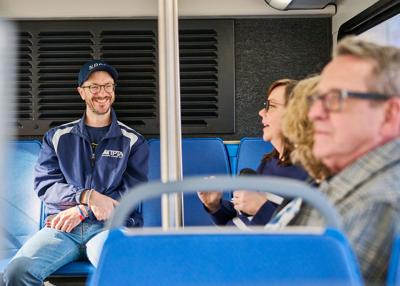Nashville, renowned for its vibrant culture and dynamic entertainment scene, is dealing with an increasingly pressing issue: traffic congestion. As the city continues to attract new residents and businesses, its roads are becoming increasingly clogged, leading to longer commute times and mounting frustration for Nashvillians. Mayor Freddie O’Connell recognizes the urgency of the situation and is taking proactive steps to address it. With plans for a transit referendum in November, Mayor O’Connell aims to garner support for a transportation and mobility project — which Metro has aptly named “Choose How You Move.”
Mayor O’Connell’s commitment and approach to reducing transportation costs and enhancing mobility is admirable. The mayor’s transition committees, commissioned when O’Connell took office, highlighted the need for dedicated funding for transportation systems. That is an excellent observation. Additionally, to ensure a comprehensive and inclusive approach, Mayor O’Connell has sought public input, engaged with Metro councilmembers and collaborated with advisory committees to craft a plan that meets Nashville’s unique needs.
O'Connell effort to focus on 'sidewalks, signals, service and safety'
In February, a report from WPLN noted the top three reasons why former Mayor Megan Barry’s 2018 transit plan failed: not seeking input from the community, an inconsistent approach regarding priorities, and hasty timing. Further, the cost was a sticker-shock-inducing $5.4 billion. To avoid repeating rejection, O’Connell is working to differentiate his approach. “We didn’t want to produce an expensive program,” the mayor told WPLN. “We wanted to look at a more right-sized approach for the city, given our growth, growth potential, cost-of-living and quality-of-life concerns.” The latter two are things that weigh on each of us, and that makes a straightforward no-frills approach a sensible choice.
Want more good news?
According to the results of Nashville’s March 22 Power Poll, 69 percent of those polled say they “like O’Connell’s more modest proposal than the massive $5.4 billion plan proposed by former Mayor Megan Barry.” Also, 57 percent “think a county-wide referendum put before voters will likely pass.” Perhaps the main reason for these higher percentages is that, as the Power Poll notes, the new plan “does not call for any light rail or tunnels beneath downtown as was proposed in the Barry plan. Emphasis instead is being placed on more sidewalks, traffic signals, bus service, and safety.”
The issue of transportation, infrastructure and traffic has only been worsening over time. And as much as we are grateful for all the beautiful things Nashville has to offer — from entertainment and the health care industry to diverse cultures, incredible shopping and fine dining — it comes with its price. The more people move here (the Nashville area is estimated to have grown at a rate of roughly 86 people per day in 2023), the more transportation issues we will find ourselves facing.
Our city has been working on this for years, making strides toward a better tomorrow. It’s certainly not that we haven’t been proactive — according to Nashville.gov, “there are over 70 neighborhood, community, citywide, and regional plans created over the last 15 years that support expanded and enhanced transportation and mobility infrastructure.” From NashvilleNext’s vision for future growth to nMotion’s blueprint for a robust public transit system, these plans have laid a strong foundation for Mayor O’Connell’s initiatives. The WalknBike Plan prioritizes pedestrian and cyclist safety, while the Vision Zero Action Plan aims to eliminate fatalities on Nashville’s streets. Additionally, initiatives like Connect Downtown and Middle Tennessee Connected have been committed to improving mobility and reducing congestion.
“Choose How You Move” builds upon this history of planning as well as recommendations from Mayor O’Connell’s transition committee. The goal is to create a transit plan that is practical and affordable yet comprehensive. O’Connell’s plan is hovering around the $1 billion mark. It’s much more affordable than the previous plan, and makes a bit more sense for our city at this particular time. The plan’s focus is on safety, infrastructure, bus service and optimizing that which we already have.
As Nashville prepares for a November referendum, it’s vital that we recognize the significance of investing in transportation and mobility infrastructure — especially as the city experiences rapid growth, and infrastructure struggles to keep pace. Mayor O’Connell’s initiative offers hope for progress. Passing this referendum would mean less traffic and frustration for all Nashvillians. And who doesn’t want that?
Bill Freeman
Bill Freeman is the owner of FW Publishing, the publishing company that produces the Nashville Scene, Nfocus, the Nashville Post and The News.






